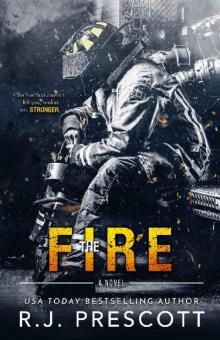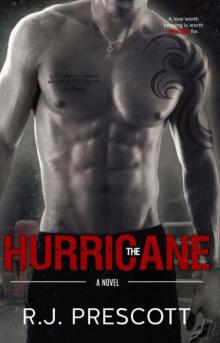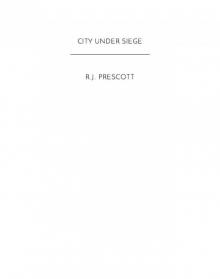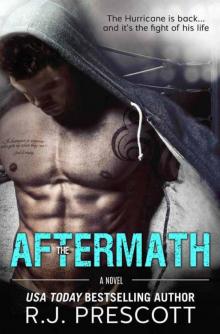- Home
- R. J. Prescott
City Under Siege
City Under Siege Read online
City Under Siege
R.J. Prescott
Contents
Also By R.J. Prescott
Prologue
Chapter 1
Chapter 2
Chapter 3
Chapter 4
Chapter 5
Chapter 6
Chapter 7
Chapter 8
Chapter 9
Chapter 10
Chapter 11
Chapter 12
Chapter 13
Chapter 14
Chapter 15
Chapter 16
Chapter 17
Chapter 18
Chapter 19
Chapter 20
Chapter 21
Chapter 22
Chapter 23
Chapter 24
Chapter 25
Chapter 26
Chapter 27
Chapter 28
Chapter 29
Chapter 30
Chapter 31
Chapter 32
Epilogue
About the Author
The Hurricane - Prologue
The Hurricane - Chapter One
Acknowledgments
Also By R.J. Prescott
The Hurricane
The Aftermath
The Storm
City Under Siege
Copyright © 2018 R.J. Prescott
All rights reserved.
First Published 2018 by R.J. Prescott
* * *
The right of R.J. Prescott to be identified as the Author of the work has been asserted to her in accordance with Copyright, Designs and Patents Act 1988.
* * *
All rights reserved. No part of this publication may be reproduced, stored in a retrieval system, or transmitted, in any form or by any means, without the prior written permission of the publisher, nor be otherwise circulated in any form of binding or cover other than that in which it is published and without similar condition being imposed on the subsequent purchaser.
* * *
This book is a work of fiction. Names, characters, establishments, organisations, and incidents are either products of the author’s imagination or are used fictitiously to give a sense of authenticity. Any resemblance to actual persons, living or dead, events or locales, is entirely coincidental.
* * *
Interior Formatting by Leigh Stone
* * *
Editing by Hot Tree Editing and Clare Reay
* * *
Cover Design by Sarah Hansen of Okay Cover Creations
Sarah
Three Months Earlier
* * *
The utilitarian metal clock, its ticking painfully loud against the silence, reminded me of the antiquated time pieces that hung on the walls of almost of my high school classrooms, and in most every office I’d ever been in. Absently, I wondered if they weren’t part of some cruel joke. Inviting pupils and employees alike to witness time slipping away within the four walls of their confines. It was these kinds of useless meanderings that helped me to bear the indeterminable wait without completely losing my shit. And I’d been close.
So very close.
Painfully near to screaming at the top of my lungs for as long as I could. The only thing that held me back was the knowledge that doing so would almost certainly lead to an immediate bullet through my brain. I didn’t want to die. When it came down to it, nobody ever really did. The instinct for self-preservation was stronger than most of us knew, and in the end, maybe that was all some people had left. But not me. The torrent of emotion raging inside me was so much stronger than a simple will to survive. In the beginning, there was only fear. But once the adrenaline had subsided, and the reality of my situation sank in, I found the ability to see past the terror and panic. To feel other things. Frustration. Helplessness. Rage. Pain.
In those final hours, I lived through all the stages of grief. Denial. Anger. Bargaining and depression. Now, finally, I was at acceptance. I accepted what was going to happen, and I hoped my life had meant something. That in the end, my actions had changed somebody else’s life for the better. I had been brave when bravery wasn’t the easiest choice, and for that I had some measure of peace. And then there was Tom. When I pictured his face, my heart wept. It was the cruellest of tragedies to be ripped away so soon from the person it had taken me a lifetime to find. But the real tragedy would’ve been to never have loved him at all. And in my darkest hour, he was here with me.
As I watched the clock hand tick over into one minute past midnight, making it officially the twenty second of January, I was struck by the irony. I was born on the twenty second, it was likely that I would die on the twenty second, and my only glimmer of hope had been that the twenty second Special Air Service would save me. I was past that now though.
After hours and hours of complete silence, voices were raised and doors slammed in a flurry of activity. Eventually, the door to my room flew open. A gun was pointed at my head while my captor screamed at me in a foreign language. Seeming to realise I didn’t understand, he gestured with his weapon for me to get up. The weight of the explosive vest strapped tightly to my chest made standing painful. But I knew from experience that not doing as I was told would lead to more discomfort. Apparently, I wasn’t moving fast enough for his liking. Grabbing me by my upper arm with a bruising grip, he dragged me into another larger room off a narrow hallway that was filled with his associates.
Gone was their icy control reserve of earlier. In its place was panic and unrest. The men argued heatedly between themselves, often pointing a gun in my direction as they spoke. My eyes wandered absently around the room as I tried to block out the noise. All of the windows I’d seen had been covered with closed blinds. The shafts of light piercing through the slats served as a reminder of the world that existed outside of this prison. Through the doorway, I could see part of a long window across the hall. The dark cloth draped across it had partially slipped. I understood then how the mind could play tricks, because a dead man stared back at me through the glass. It didn’t matter that he wasn’t real. What mattered was that the last face I’d ever see wouldn’t be looking at me with eyes filled with hate. Closing my eyes against the pain, I felt a single tear track slowly down my cheek, before the world exploded. After that, I felt nothing at all.
Sarah
As I watched both coffins lower slowly into the ground, I felt as though I was made of stone. Like any other statue in a graveyard filled with effigies, I stood in solemn tribute to the last of my immediate family. Rain pelted down mercilessly over the crowd of London’s finest, most of whom were completely unprepared for the brutal Yorkshire weather. My aunt Elizabeth told me it was ridiculous to have Dad and John buried here, and didn’t I care how much I inconvenienced their friends by making them travel all this way from London? It was on the tip of my tongue to tell her that I didn’t give a shit about any of them, but Dad wouldn’t have wanted that. So I said nothing and replied by booking the funeral anyway. If she had her way, there’d be a state procession that ended at St Paul’s Cathedral.
Despite what you might think, I didn’t drag everyone two hundred and fifty miles just to piss off Dad’s sister. I did it so that in death, they’d feel free. Like I did, standing on the Yorkshire moors with the wind in my face, remembering my mum dancing around with John and me like a crazy person. Dad’s family might come from money, but Mum had been a down-to-earth northern lass through and through. She’d been Dad’s moment of madness, and he had loved her like no other until the day she died. But cancer was such a cruel, merciless bitch. Not content with taking lives, she also stole the spirit of those she left behind. One day my beautiful, free-spirited, effervescent mum was teaching me to cartwheel through the long grass, and less than eight
months later, she was gone, and with her the soul of her beloved. Dad was never the same after she passed. In his loss, his sister stepped in to help raise us and guide him as to the example he should set. Cottage holidays on the moors and Lake District gave way to cocktail parties on yachts in Monaco as she finally had him living up to the Tatem name. Eventually, even John and I drifted apart. With ten years between us, I was sent to an all-girls boarding school to finish out my education, and following John’s graduation from university, he joined Tatem Shipping and fell into the vapid wormhole of life as a shipping magnate.
As for me, I did everything I could to disappoint them. In contrast to John’s feng shui, minimalist monstrosity of a house, my eclectic flat was filled with textures, colours, and light. Sketches, paintings, drawings, and doodles were scattered haphazardly around potted plants and wild flower-filled jam jars. I’d refused Dad’s offer to help me find something “a bit more up market” and instead relished in the beauty of the fact that I was paying my own way. Standing on my own two feet without a penny of my family’s money, doing something I knew Mum would’ve loved. I illustrated children’s books, and every once in a while, I had the privilege of contributing to charity books that benefited Great Ormond Street Children’s Hospital. Maybe I wasn’t setting the world of business and commerce on fire, and I’d certainly never be making the society pages, but I was happy. Or at least I was until that cold September day when the phone rang and didn’t stop.
Aunt Elizabeth had been the one to tell me that my father and brother had been on their way to a board meeting together, when they’d been involved in a tragic accident. Apparently, a truck jumping a red light had ploughed into the side of their town car, killing them almost instantly. For hours I’d sat there, too numb to shed a tear until I worked out how long it had been since Dad and I had spoken last. Honestly, I thought it hurt him to even look at me. He was kind and generous and spent every minute of every conversation we’d ever had trying to buy me things. But I was my mother through and through, and every moment we spent together made it harder for him to bear. The older I became, the more I reminded him of everything he’d lost. So, I embraced her memory while Dad and John did their best to forget it. I guess we all dealt with grief in our own way. But the distance between us didn’t make this moment any less painful. In fact, it felt like losing Mum all over again.
The priest said one last short prayer over their graves, and the crowd of strangers I barely even knew scurried away like insects.
“Sarah, if you’re going to be travelling in the family car with me, we need to leave now. It isn’t appropriate that we should be the last to arrive at the wake,” Aunt Elizabeth remarked.
“Surely people won’t begrudge us a few minutes to say our goodbyes,” I reasoned.
She sighed deeply, as though I was an obstinate child unnecessarily testing her patience.
“Sarah, I understand that you’ve led somewhat of a cosseted life. Despite my advice, your father humoured your bohemian leanings and indulged you in all of your artistic nonsense. But I’m afraid you no longer have the luxury of selfishness. The time for that way of thinking is over. Like it or not, you are now the head of Tatem Shipping and you must act accordingly. A great number of the people here are shareholders. How do you think share prices will be affected if they see you as anything other than a strong leader? Of course, I will be able to school you in social etiquette, but you must stop pandering to your emotions for the sake of the company,” she said, stunning me speechless for a moment.
Rather naively perhaps, I’d hoped that the younger version of myself had somehow villainised her. That she’d come over to offer me a hug, or some words of comfort in our shared grief. I was disappointed, but not surprised by the confrontation. Her manipulation and meddling had worked with my father, but she was about to learn that they wouldn’t work with me.
“Aunt Elizabeth, I appreciate that you were close to my father, and that he regularly sought your advice on many matters, so please don’t think that I mean this disrespectfully, but I don’t really care how many shareholders are here or why they came. I don’t care about my outfit or my timekeeping or even my etiquette. Tomorrow I’ll do whatever needs to be done. Today, I’m saying goodbye to my family,” I replied.
Turning my back, I walked closer to the graveside and closed my eyes as I inhaled the scent of fresh rain. Elizabeth snorted indignantly, but I could hear the sound of her footsteps as she walked away. Regardless of what happened, neither of us had the luxury of turning our back on one another permanently. She was a board member who held valuable company shares. If it was up to me, I’d liquidate the company tomorrow, but thousands of livelihoods depended on Tatem Shipping for employment. There was no way I was cut out to do this forever, but to a certain degree, she was right. Without a Tatem at the helm, share prices would plummet, and everyone from the little guy paying his mortgage to my richer than Onassis aunt would be ruined. So I made a deal with my conscience. I would stay for a few years until the stability of the company was assured, and then I’d wash my hands of the Tatem name for good. I looked out across the bleak, unforgiving beauty of the moors, the wind whipping away my tears before they could fall, and I felt nothing but despair. Because if the last few days had been anything to go by, the next few years would be interminable.
“I’m sorry to disturb you Miss Tatem, but there’s a Mr Vasili Agheenco here to see you,” Victoria said. She’d been Dad’s secretary since he first started at the firm, and I was sure she felt his loss as much as I did. In the weeks that had passed since the funeral, I’d been drowning in everything I didn’t know. Bombarded with information I had no idea how to interpret and decisions I had no idea how to make. Each of the board members had their own vision of the company’s future and were little to no help at all. But in the middle of the quagmire, Victoria would appear with a cup of tea and a few desperately needed chocolate biscuits. I was pretty sure that she was shielding me from the worst of things. I was sailing alone in the dark, and without her I’d be rudderless. Yet, despite all of my pleading, she still wouldn’t call me by my first name.
“Does he have an appointment? I wasn’t expecting to meet with anyone this afternoon,” I replied. Hoped was more like. I didn’t think I could take one more meeting with an over-opinionated director or nervous stockholder.
“No. He doesn’t have an appointment,” she replied nervously. “But Mr Agheenco doesn’t make them. He didn’t come in often, but when he did, your father would always see him.”
“What aren’t you telling me?” I asked anxiously. Victoria was completely unflappable. Her edginess about this guy made me feel uneasy.
“To be honest, there’s something about him that scares me. When he came by, your father would send me out on some meaningless errand, and by the time I’d get back he was gone. I tried to talk to him about it a few times, but he would always change the subject. I don’t know what it is about him, but he seems so…uncivilised,” she explained.
I sighed deeply and contemplated what to do. I couldn’t imagine Dad having continued associations with someone dangerous, but her reaction made me uncomfortable. I could try and postpone, but with things being as unstable as they were, I didn’t want to risk offending a potential client.
“It’s all right, Victoria, I’ll see him. But would you mind staying in your office while he’s here?” I asked, and she nodded as she left. Hers was a connecting room that led from the end of a hallway into Dad’s. Tatem Shipping had modern offices in a number of cities, but Dad had kept the London head office in the original, listed, turn of the century building in which his grandfather had founded the company. The many rooms and anterooms didn’t lend themselves to modern, open-plan office working, but I agreed with his decision. In a world that was dreary and humdrum, this antiquated building had character.
A sharp knock at the door preceded Victoria with my visitor.
“Miss Tatem, this is Mr Agheenco,” Victoria said, holding the doo
r open. Rather rudely, he waved his hand to dismiss her, and wearing a small frown, she closed the door with a quiet click. Knowing she was close by to call security if needed made me feel a little easier, but only when I was in his presence did I understand why she’d been so unnerved.
“I have heard a great deal about you, Miss Tatem, but nobody told me how beautiful you were,” he remarked. Dressed sharply in what looked to be an expensive tailored suit, his salt and peppered hair neatly trimmed, there was nothing outwardly to suggest that he was anything other than a respectable business man. His impeccable English, even heavily laced as it was with an obvious Russian accent, suggested that he’d been well-educated. He had a slight build and was perhaps only around five foot ten, but it was his eyes that made him so terrifying. Cold, empty eyes that undressed me from across the room. Without invitation, he sat himself in a leather chair and made himself comfortable in a way he’d clearly done before.
“Thank you for the compliment,” I replied politely. “How is it I can help you today?”
Surprising me, he barked out a laugh.

 Christmas Encounter
Christmas Encounter The Fire (Hurricane Book 4)
The Fire (Hurricane Book 4) The Storm
The Storm The Hurricane
The Hurricane City Under Siege
City Under Siege The Aftermath
The Aftermath